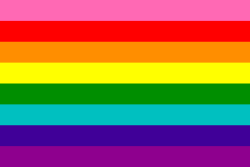
Back Gay Pride Afrikaans فخر مثليين Arabic Gey prayd Azerbaijani Гей гордост Bulgarian Orgull gai Catalan شانازیی ھاوڕەگەزخوازان CKB Balchder hoyw Welsh LGBT-Pride German Orgullo LGBT Spanish افتخار الجیبیتی Persian


| Part of a series on |
| LGBT topics |
|---|
|
|

LGBT pride (also known as gay pride or simply pride) is the promotion of the self-affirmation, dignity, equality, and increased visibility of lesbian, gay, bisexual, and transgender (LGBT) people as a social group. Pride, as opposed to shame and social stigma, is the predominant outlook that bolsters most LGBT rights movements. Pride has lent its name to LGBT-themed organizations, institutes, foundations, book titles, periodicals, a cable TV channel, and the Pride Library.
Ranging from solemn to carnivalesque, pride events are typically held during LGBT Pride Month or some other period that commemorates a turning point in a country's LGBT history, for example Moscow Pride in May for the anniversary of Russia's 1993 decriminalization of homosexuality. Some pride events include LGBT pride parades and marches, rallies, commemorations, community days, dance parties, and festivals.
Common symbols of pride include the rainbow flag and other pride flags, the lowercase Greek letter lambda (λ), the pink triangle and the black triangle, these latter two reclaimed from use as badges of shame in Nazi concentration camps.[8]
- ^ Michael K. Lavers, "NAACP president: Marriage is civil rights issue of our times" Washington Blade, 21 May 2012; available online Archived August 7, 2020, at the Wayback Machine
- ^ Julia Goicichea (August 16, 2017). "Why New York City Is a Major Destination for LGBT Travelers". The Culture Trip. Archived from the original on January 2, 2020. Retrieved February 2, 2019.
- ^ Eli Rosenberg (June 24, 2016). "Stonewall Inn Named National Monument, a First for the Gay Rights Movement". The New York Times. Archived from the original on May 6, 2020. Retrieved June 25, 2016.
- ^ "Workforce Diversity The Stonewall Inn, National Historic Landmark National Register Number: 99000562". National Park Service, U.S. Department of the Interior. Archived from the original on March 6, 2016. Retrieved April 21, 2016.
- ^ "History of the LGBT rainbow flag on its 37th anniversary". New York Daily News. 2015. Archived from the original on November 25, 2018. Retrieved November 25, 2018.
- ^ Morgan, Thad (June 2, 2017). "How Did the Rainbow Flag Become an LGBT Symbol?". History Network. A&E Networks. Archived from the original on November 25, 2018. Retrieved November 25, 2018.
- ^ Van Niekerken, Bill (June 22, 2018). "A history of gay rights in San Francisco". San Francisco Chronicle. Archived from the original on September 14, 2018. Retrieved November 25, 2018.
- ^ "Symbols of the Gay, Lesbian, Bisexual, and Transgender Movements". Lambda. Archived from the original on August 16, 2007. Retrieved July 30, 2007.
© MMXXIII Rich X Search. We shall prevail. All rights reserved. Rich X Search